Sports
/ArcaMax

What stood out about Magic at Las Vegas Summer League and what's next
ORLANDO, Fla. — Although the Magic lost all five summer league exhibitions they played in Las Vegas, coach Ameer Bahhur still had plenty to like from what he saw throughout the team’s 10 days out west.
In fact, Orlando lost to three of the four teams that reached the tournament semifinals — two of which it fell to by a combined six points...Read more
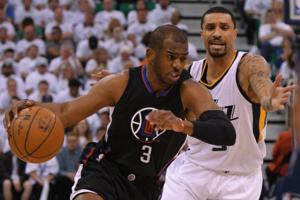
Clippers continue to 'strongly' consider signing Chris Paul
LOS ANGELES — As Clippers president of basketball operations Lawrence Frank conducted his Zoom with the media Saturday from the team’s practice facility, he looked to his right and mentioned how James Harden was in the gym working out and how Harden played a pivotal role in the team signing free-agent guard Bradley Beal.
But Frank is not ...Read more
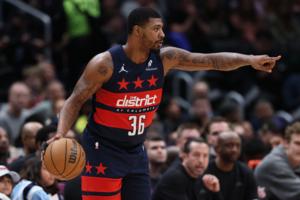
Marcus Smart plans to join Lakers after Wizards buy out contract
LOS ANGELES — The Lakers have found their point-of-attack, defensive-mind wing defender in guard Marcus Smart, who has agreed to a buyout with the Washington Wizards and plans to sign a two-year, $11 million deal with Los Angeles, people not authorized to speak publicly on the matter confirmed to The Los Angeles Times on Saturday.
Smart, the ...Read more

Mirjam Swanson: Kiki Iriafen's smooth evolution from WNBA rookie to All-Star
LOS ANGELES — Something about Kiki Iriafen, the Washington Mystics’ Tarzana-born rookie forward – she’s not going to wait for your invitation.
No, she’ll do it herself, on her own timeline, make a beeline from A past B straight to the W, where her WNBA dream job is exceeding her own lofty expectations.
The 21-year-old — you might ...Read more

Bulls sign guard Yuki Kawamura -- the shortest player in the NBA -- to a two-way contract
CHICAGO — The Chicago Bulls signed guard Yuki Kawamura to a two-way contract Saturday, rewarding the point guard for a strong summer league performance in Las Vegas.
The Bulls might have entered the NBA Summer League focused on rookie Noa Essengue and second-year forward Matas Buzelis, but Kawamura quickly stole the show. He averaged 10.2 ...Read more

Matas Buzelis embraces Year 2 expectations as a leader on the ball -- and off the court -- for the Bulls
CHICAGO — Matas Buzelis believes he can be great.
Not just great. The greatest.
The second-year forward doesn’t particularly care that he was drafted at No. 11 last summer. Or that he spent the first half of his rookie season mostly on the bench. When Buzelis writes down affirmations of his visions for the future, they follow the same ...Read more

Mark Story: Todd Svoboda's year of challenges and triumphs after leg amputation
LEXINGTON, Ky. — For Todd Svoboda, the one-year anniversary of the amputation of his right leg was July 11.
On that day, the ex-Kentucky Wildcats men’s basketball player sat at the dinner table with his wife, Franci, and reflected on 12 months unlike any other in his life.
“It hasn’t been easy,” Svoboda says. “But, so far, there’...Read more

Sean Keeler: Cam Johnson? Jonas Valanciunas? David Adelman has Nuggets team Michael Malone always wanted. He better not blow it.
DENVER — Nicholas Cage and Lisa Marie Presley got a longer honeymoon than David Adelman.
Man, it was fun, though. Right? Eighty-five days, pure bliss, from interim status to the Michael Porter Jr. trade. We’ll always have Sacramento, Coach. We’ll always have Inglewood.
“I want to win,” new Nuggets forward Cam Johnson said Friday at ...Read more

Liberty guard Natasha Cloud wins WNBA All-Star Skills Challenge; teammate Sabrina Ionescu wins 3-point contest
INDIANAPOLIS — New York Liberty guard Natasha Cloud may not have been named to a WNBA All-Star team, but she still made her presence felt on All-Star weekend. The Broomall, Pa., native took home the All-Star Skills Challenge crown, in addition to a $57,575 cash prize.
Cloud led wire-to-wire in the challenge, posting the best time in the first...Read more

How Kayla Thornton became a WNBA All-Star, Valkyries' best player
SAN FRANCISCO — Kayla Thornton is not one to brag about individual honors.
The 32-year old Valkyries forward and El Paso, Texas, native carries herself with a laid-back, southern humbleness that keeps the focus on her team rather than herself.
But when she learned she was going to be an All-Star for the first time in her 10th WNBA season, ...Read more

ESPN report sheds light on unusual betting activity surrounding Heat's Terry Rozier in 2023 game
MIAMI — As federal prosecutors continue to investigate whether Miami Heat guard Terry Rozier manipulated his performance as part of an illegal sports betting scheme, additional details surrounding the Rozier case have been made public.
A report by ESPN on Friday shed light on the unusual wagering activity under scrutiny, noting that “a ...Read more

Missouri men's basketball lands one of nation's top guards as Tigers' 1st 5-star recruit since 2017
Missouri men’s basketball coach Dennis Gates’ first commitment for the 2026 roster is a big one.
Mizzou on Friday landed a commitment from five-star recruit Jason Crowe Jr. from Inglewood High School in California. A top-rated point guard for the 2026 class, per Rivals, made the announcement on CBS Sports HQ.
Crowe is regarded as one of ...Read more
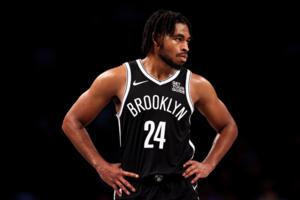
Nets guard Cam Thomas rebuts critics amid free-agency talks
NEW YORK — All has been quiet on the Cam Thomas front recently.
NBA free agency began June 30, but the Nets’ polarizing young scoring guard remains unsigned.
He is joined by notable restricted free agents like Golden State’s Jonathan Kuminga, Chicago’s Josh Giddey and Philadelphia’s Quentin Grimes.
“I look forward to the summer ...Read more

Liberty's Sabrina Ionescu aims to beat her own record at WNBA 3-point contest: 'I'm staying optimistic'
When Sabrina Ionescu takes the court for Friday night’s 3-point contest, she won’t be competing against just her fellow All-Stars.
She’ll be chasing more history.
“My goal is to try and beat my record,” Ionescu said after her Liberty’s 98-77 win over the Indiana Fever on Wednesday night. “Not sure if that’s going to happen, but...Read more
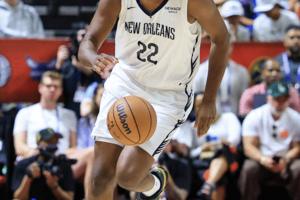
Ex-Maryland star Derik Queen has wrist surgery after NBA Summer League injury
BALTIMORE — After recording a double-double in all three of his NBA Summer League appearances, New Orleans Pelicans rookie Derik Queen suffered a setback.
Queen, a Baltimore native and former Maryland star, underwent left wrist surgery to repair a torn ligament, the team announced Friday. He suffered the injury on July 15 in a game against ...Read more

Erica Wheeler's pickleball tournament kicks off WNBA All-Star weekend
INDIANAPOLIS — Before their last game, Erica Wheeler surprised Storm teammates and coaches with a white-gold necklace, diamond-encrusted tennis bracelet and team-logo pendent courtesy of jeweler GLD.
“Why?” she said. “Just because. … We family. You do for family. Simple as that. I’d do anything for them. Besides, they looked like ...Read more

How Collin Sexton is rapidly casting large shadow despite short tenure with Hornets
LAS VEGAS — Taking a brief respite from enjoying a little Las Vegas Summer League action and hanging with a bunch of new teammates, Collin Sexton leaves little doubt about his level of enthusiasm.
If anyone is wondering how the veteran guard feels less than a month after being dealt to the Charlotte Hornets from the Utah Jazz, the bouncy ...Read more
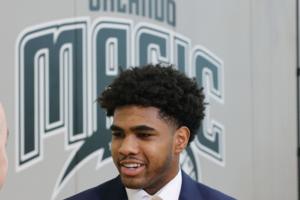
Jason 'Jase' Richardson II, son of beloved Warrior, pursues his own NBA dream
LAS VEGAS — Jason Richardson wonders where the time went.
It seemed like, just yesterday, little Jason “Jase” Richardson II was the toddler who would dance in the locker room after Warriors wins during the “We Believe” run that captivated the Bay Area in 2008.
That kid who followed Baron Davis, Stephen Jackson and Matt Barnes around ...Read more
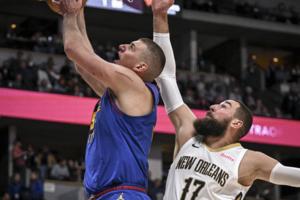
Troy Renck: Only one way for Nuggets to handle Jonas Valanciunas drama: Play hard ball
DENVER — It doesn’t matter if he sees himself as a bonus Jonas, wanting to join brothers Kevin, Nick and Joe on the Living The Dream tour.
It doesn’t matter if he wants a reality TV show, “My Big Fat Greek Meeting,” about his negotiations with Panathinaikos.
Jonas Valanciunas is a Denver Nugget.
The trade went through, making Dario ...Read more
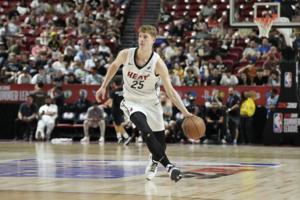
Summer still uneven for Kasparas Jakucionis as Heat fall to Pistons in Vegas
There likely won’t be many, if any days, this season when Kasparas Jakucionis will have the opportunity to be the leading man for the Miami Heat. Thursday at the Las Vegas NBA Summer League, was one that came practically by default.
And again left questions about the guard out of Illinois taken at No. 20 last month by the Heat.
With Kel’el...Read more
Popular Stories
- ESPN report sheds light on unusual betting activity surrounding Heat's Terry Rozier in 2023 game
- Sean Keeler: Cam Johnson? Jonas Valanciunas? David Adelman has Nuggets team Michael Malone always wanted. He better not blow it.
- Liberty guard Natasha Cloud wins WNBA All-Star Skills Challenge; teammate Sabrina Ionescu wins 3-point contest
- How Kayla Thornton became a WNBA All-Star, Valkyries' best player
- Mark Story: Todd Svoboda's year of challenges and triumphs after leg amputation





